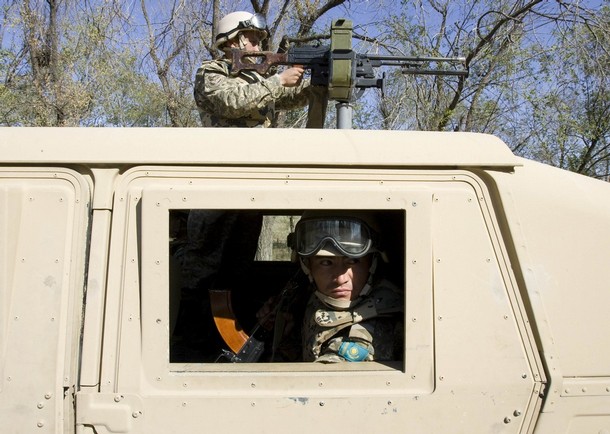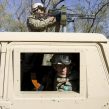
Astana Steps Closer to Military Alliance with Moscow
Publication: Eurasia Daily Monitor Volume: 6 Issue: 117
By:

In his address to the Collective Security Treaty Organization’s (CSTO) summit in Moscow on June 14, Kazakhstan’s President Nursultan Nazarbayev assured his counterparts, above all the Russian President Dmitry Medvedev, that his country unreservedly supports all projects aimed at strengthening this organization. Indeed, Kazakhstan, surrounded by turbulent neighbors, has displayed increasing willingness to develop a closer military partnership with Russia. In September 2008 Astana hosted a meeting of the heads of the CSTO members, which was crucial for the later creation of the organization’s military body, the Collective Operational Reaction Force (CORF). Although the objectives and the forms of interaction with other partners within the CORF, reminiscent in many ways of the socialist-era Warsaw Pact Organization, do not match the national security interests of Kazakhstan, Nazarbayev, speaking at the last CSTO summit in Moscow in February, attempted to convince others that the idea of setting up the new military structure was proving successful.
Although Medvedev haughtily played down the refusal of Belarus to sign the CORF treaty as well as Uzbekistan’s multiple reservations, Sergey Zhiltsov, the director of the Moscow-based CIS Center, questioned the idea of unanimity over the new force. In an interview with a newspaper in Kazakhstan, he expressed his fear that deep disagreements on all the key issues will significantly weaken the future effectiveness of the CSTO (Aikyn, June 16).
While Moscow’s intentions to use the CORF as a potential counterweight to NATO’s eastward expansion, and in response to the American military presence in Afghanistan are clear, Kazakhstan’s role in this military structure remains open to question. In theory it can offer 4,000 troops from its three airborne assault brigades, and has agreed to be the second largest military force within the new structure. Kazakhstan still appears vulnerable to any outside threat in the face of the overpowering Russian regional military dominance (Kazakhstanskaya Pravda, June16).
Since 2004 Kazakhstan has regularly participated in the Rubezh military exercises within the CSTO, but even its peacekeeping battalion (KAZBAT), an element of which was deployed in Iraq and later transformed into KAZBRIG, lacks any combat experience. The most significant contribution of Kazakhstan to the CORF is the 36th special task force brigade, stationed in Kapchagai, near Almaty. But its past experience is limited to supporting a dubious and non-combat mission in Afghanistan. This unit was once directly subordinated to the main intelligence department of the Soviet General Staff. But it is unable keep pace with the changing nature of modern warfare, especially within the evolving geopolitical situation. Nevertheless, in Moscow Nazarbayev readily signed the final agreement on the force following a brief discussion with Medvedev, just one hour before the opening of the CSTO summit (Kazakhstanskaya Pravda, June 16).
The Kazakh president was not embarrassed by the eloquent refusal of his Belarusian counterpart Alyaksandr Lukashenka to attend the summit or by the cool attitude to the agreement by Uzbekistan and Tajikistan. He simply echoed what Medvedev had to say on military cooperation within the framework of the CSTO, long regarded by analysts in Kazakhstan as a vital tool in advancing Russian expansionist policies in Central Asia. Political observers in Astana question the capability of the CSTO to resolve latent regional conflicts within Central Asia. Moreover, in Kazakhstan very few analysts believe that the force, which is fully controlled by Moscow, will in any way influence the security situation in Afghanistan, since neither the CSTO nor the Shanghai Cooperation Organization (SCO) has any real leverage to do so (Liter, June 16).
Kazakhstan’s seemingly enthusiastic support for the creation of the CORF can be viewed only within the context of its deepening bilateral military cooperation with Russia. Although in reality there is little Astana could gain, in terms of Russian technical assistance to modernize its army, maintaining good relations with its powerful and increasingly aggressive neighbor with geopolitical ambitions is the only option for Kazakhstan. Indeed, many believe that the country is not regarded as an urgent priority by NATO or the United States -owing to their preoccupation with Afghanistan.
On June 11, during a meeting on cooperation with foreign states, Medvedev announced that Russia is considering the possibility of the joint development and manufacturing of armaments with the CSTO member states. It was another tempting carrot for Astana, which is entirely dependent on Russian military hardware and technical assistance. However, full-scale cooperation within such structures as the CORF requires the introduction of amendments to national legislation. With a compliant legislative body in Kazakhstan, those hurdles could easily be overcome (Interfax, June 11).
However, the danger is that the CORF might be used in future by Moscow to embroil Central Asian countries in regional conflicts to advance Russian interests. Until now Kazakhstan has successfully avoided any military involvement in Russian-led conflicts. But Russia is more persistent in its attempts to secure support from the Central Asian states to form a military alliance following last year’s war with Georgia. For Moscow, moral support from its allies in the region will be far more important than any military participation to justify aggression in the way the Kremlin treated Georgia last August.




